英语必修四Unit1 英语重点笔记
06 高一英语重难点知识汇总——必修四 Unit 1
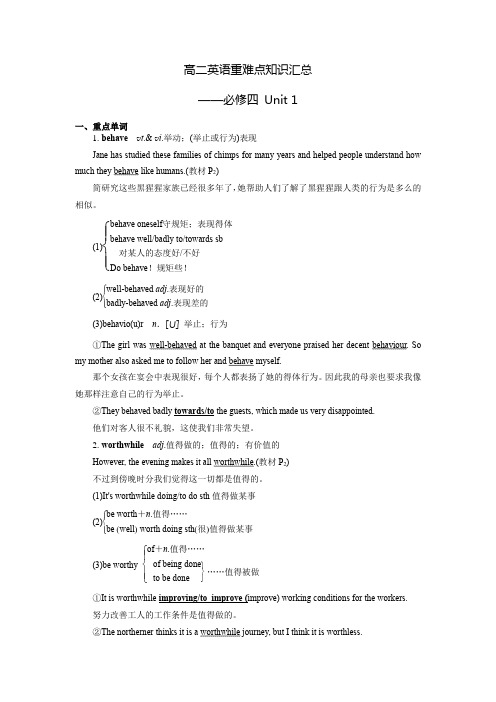
高二英语重难点知识汇总——必修四 Unit 1一、重点单词1. behave v t .& v i .举动;(举止或行为)表现Jane has studied these families of chimps for many years and helped people understand how much they behave like humans.(教材P 2)简研究这些黑猩猩家族已经很多年了,她帮助人们了解了黑猩猩跟人类的行为是多么的相似。
(1)⎩⎪⎨⎪⎧ behave oneself 守规矩;表现得体behave well/badly to/towards sb 对某人的态度好/不好Do behave !规矩些!(2)⎩⎪⎨⎪⎧wellbehaved adj .表现好的badlybehaved adj .表现差的 (3)behavio(u)r n .[U] 举止;行为①The girl was wellbehaved at the banquet and everyone praised her decent behaviour. So my mother also asked me to follow her and behave myself.那个女孩在宴会中表现很好,每个人都表扬了她的得体行为。
因此我的母亲也要求我像她那样注意自己的行为举止。
②They behaved badly towards/to the guests, which made us very disappointed.他们对客人很不礼貌,这使我们非常失望。
2. worthwhile adj .值得做的;值得的;有价值的However, the evening makes it all worthwhile.(教材P 2)不过到傍晚时分我们觉得这一切都是值得的。
人教版高中英语必修4unit1课文知识点详解
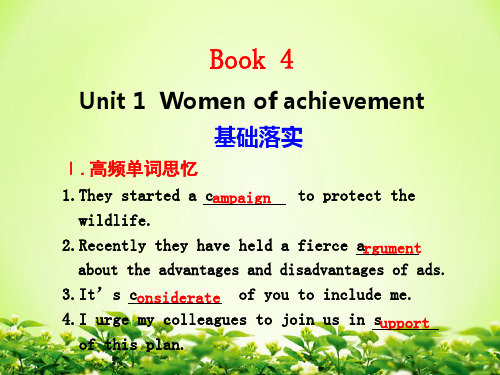
归纳总结 observe _v_t_._看__到__;__观__察__到__;__注__意__到__;__遵__守_。 observe属于感观动词,在主动语态中,作宾补的不 定式 不带to ,但在被动语态中则必须 用to 。 observe+宾语+do/doing sth.看到,察觉到某人做 某事/正在做某事 observe sth.观察(注意到)某事物 observe that...观察到…… observe on/upon sth.关于……陈述意见 observe a child’s behavior观察一个孩子的行为 observe the terms of a contract遵守合同的条款
A library with 100 books was denoted to our school
3.She is leading a busy life but she says: “Once I stop,it all comes crowding in and I remember the chimps in laboratories.”她 的生活是繁忙的,然而,她却说:“我一旦停下 来,所有的一切都会涌上心头,我就会想起实验 室里的黑猩猩。” 考点提炼 once I stop是once引导的_时__间__状__语_ 从句,主句是由_a_n_d连接的两个并列分句,crowding in为现在分词短语作伴随状语,修饰comes。
Book 4
Unit 1 Women of achievement
基础落实
Ⅰ.高频单词思忆
1.They started a campaign to protect the wildlife.
2.Recently they have held a fierce argument about the advantages and disadvantages of ads.
高中英语必修4第一单元知识点

必修四unit oneachieve [ 3‘t j i:v] vt.完成;达至U【经典例句】By hard working we can achieve anything. 只要我们努力,任何事情都能成功.【考点聚焦】同义词:accomplish v.完成(任务等);2)名词:achievement成就;功绩entertain—entertainment,move -movement,equip -equipmentjudge—judg(e)mentm,等.3) achieve的常见搭配:我的记忆卡achieve success获得成功achieve victory 取得胜禾1achieve one ' s purpose 目的achieve one ' sOm 目标achieve a good result彳导至U好的结果achieve one ' s go现某人的目标2) mean的用法Mean doing sth. 意味着做…Eg. Doing such a thing means wasting time.mean to do sth 打算做某事eg. Do you mean to go without moneybehave [b工*heIv] vt. & vi.举动;举止;行为表现【经典例句】He behaved with great courage in the battle. 他在这次战斗中表现得非常勇敢.【考点聚焦】1〕 behavio〔u〕r n.举止;行为;表现;misbehavio〔u〕r n.不良行为2〕常用搭配:behave oneself使举止好;使举止规矩worthwhile [w 3 :日〔h〕wa工l] adj.值得花时间〔精力〕的;有价值的【经典例句】It is worthwhile to visit the museum. 参观这个博物馆是值得的.【考点聚焦】1〕区别worthwhile与worth , worthy的用法:worthwhile意为值得〞,指花时间、精力、金钱等去做某事是值得的.如:It is worthwhile to read the book.=It is worthwhile reading the book.= Reading the book is worthwhile.这本书值得一读.但不可以说The book is worthwhile reading.worth表示访值……〞时,后接价值数量词;当表示值得〞时,后接名词、代词或动名词〔不能接不定式〕,常用well修饰,不用very.如:This laptop is worth 10 000 yuan and it is well worth buying.这台笔记本电脑值10 000元,很值得买.worthy表示值得〞时,常作表语,结构为worthy of sth..如:It is a worthy cause and worthy of our hardworking.这是一份高尚的事业,值得我们努力. worthy后面还可接动名词或不定式,结构分别是worthy of being done和worthy to be done.如:The incident is worthy of being remembered.=The incident is worthy to be remembered .这次事件值得纪念.observe [nb1z3:v] vt.观察;观测;遵守【经典例句】We should strictly observe the discipline. 我们应该严格遵守纪律.1)同根词:observer n.观察者observation n.观察;观测2)observe 的用法:They were observed to enter the bank/entering the bank. 他们被注意着进了专艮行.The boy observed what was going on between Tom and his sister.这个男孩注意着汤姆和他姐姐之间所发生的事.〔3〕举行〔仪式等〕,庆祝〔节日等〕Do you observe Christmas Day_in your country 你们国家的人庆祝圣诞节吗3〕当表示看“时,observe, watch, see, notice 的区另U:observe相当于watch carefully ,指从不同的角度长时间地看并研究, 尤其用于实验或研究等场合,如observe the stars 〔观察星星〕,observe the behavior of birds 〔观察鸟类的习性〕等;watch意为看;观看,特别留意、感兴趣地看运动着的东西〞.如watch TV 〔看电视〕,watcha game 〔观看比赛〕等;outEg. I can ' t work out the meaning of the poem〔, 说出〕Things have worked out badly.〔进行,开展〕Work out his income 〔算出〕Work out a plan 〔制定,拟定〕argue [' a: gju : ] vi.争论;辩论vt.争论;说服【经典例句] He argued that the experiment could be done in another way.他认为这项实验可以换一种方法做.2〕argue的用法:argue with over sth.由于.... 和 ... 争辩,如:They are arguing with the officials over foreign policies. 他们正就夕卜交政策与官员们进行辩论. argue+that 从句,如:We argued that we should be paid more.我们据理力争我们应该得到更高的薪水.argue for/against提出理由支持/反对,如:He argued against the use of animals in this experiment. 他反对用动物做这个实验.entertainment [匚付4te工n、[nt] n.款待;娱乐;娱乐表演例句】This is a serious novel, not an entertainment. 这是一本严肃的小说,不是消遣读物.【考点聚焦】1〕同根词:entertain v.招待;款待;使...... 欢乐;给..... 娱乐;entertaining adj.使人愉快的;有趣的2〕与entertainment相关的词组:provide entertainment for... 为..... 提供娱乐give an entertainment to sb.招待某人inspire [〈n Ml spa焉]vt.鼓舞;感动;激发;启示【经典例句】We are all inspired by the heroic deeds of Dr. Bethune.白求恩的英雄事迹使我们大家深受鼓舞.【考点聚焦】1〕名词:inspiration n.灵感;启发;鼓舞人的事或人2〕inspire 的用法:His speech inspired us.他的发言鼓舞了我们.He inspired me to try again. 他鼓励我再试一次.3〕inspiring 和inspired 的区另kThe students were all inspired by the inspiring song.学生们都被这首振奋人心的歌曲所鼓舞.communication [k ^J mju : n,'ke工」n] n.通讯;通信;交流【经典例句】He has been in communication with his family. 他一直与家里保持联系.strike [stra工k] v.打击;才T动n.罢工;袭击【经典例句】The union leaders called on a strike .工会领导号召罢工.【考点聚焦】1〕同根词:striker n.罢工者;打击者;striking adj.惹人注目的;打击的;stike 的过去式是struck, 过去分词是struck 或stricken,现在分词是striking.2〕strike的其他一些词义:vt.打;敲;击;袭击;击中;划火柴.如:I struck a match and held it to his cigarette. 我划着一根火柴伸到他的烟上.vt.忽然想起;某种想法忽然出现;给人留下印象.如:An idea suddenly struck me.我忽然心生一计.consideration [k = n^s工d n'reiJ^n] n.考虑;体谅【经典例句】After long consideration he agreed to their requests.考虑许久以后,他同意了他们的请求.【考点聚焦】1〕同根词:considerate adj.体贴人的;体谅人的;considered adj.经过深思熟虑的;considering prep.考虑至U; 就....而论2〕动词consider 〔vt.考虑;认为〕的用法:后接名词、动名词、疑问词+不定式或宾语从句.如:I' m conseding changing my job.我正考虑换个工作. 〔接动名词〕take sth. into consideration 考虑至UYour teacher will take your recent illness into consideration when judging your paper.deliver [d工'口g] vt.递送;生〔小孩〕;发表〔演说等〕【经典例句】The professor delivered a lecture to us yesterday.教授昨天给我们作了个讲座.【考点聚焦】1〕名词:delivery n.投递;发送;分娩2〕deliver作生〔小孩〕“解时与bear的区别:She was delivered of a healthy boy. 她生下一个健康的男孩儿.bear作生育〞解时是及物动词,如:She bore 〔has borne〕six children.她生了六个孩子.短语巧记典句考点either...or 不是.... 就是....【经典例句】She is either drunk or mad.她不是醉了就是疯了.2〕在either...or的句子中,谓语动词的单复数根据就近的主语而定.如:Either you or your twin sister has broken the glass. 不是你就是你的双胞胎姐姐打碎了杯子.同类用法有:neither...nor两者都不......neither...nor的反义词为both...and两者'都 ..... ",谓语动词那么为复数.be determined to do sth. 决心做某事【经典例句】We are determined to succeed this time.这次我们决心要取得成功.【考点聚焦】1〕同义词组:make up one' s mind 〔to do sth.〕2〕determine vt.〔使〕决定;确定,其用法如下:determine+不定式,如:He determined to learn English.他决定学英语.determine+从句,如:He determined that he would leave.他决定离开.3〕be determined to do sth.短语中determined是形容词,意为坚决的“,还可作定语.如:Madame Curie was a determined woman and set a good example to us.居里夫人是一位坚强的女性,给我们树立了好典范.argue for提供支持的理由,为支持....... 而辩论【经典例句】The workers argued for the right to strike.工人们为争取罢工的权力而辩论.【考点聚焦】1)常用搭配:argue with (over)sth.与某人辩论某事,如:They are arguing with their classmates about the solution to the problem. 他们正和同班同学争论这个难题的解决方案.2)注意argue后面的介词for和against分别表示不同的含义:Some people argue for free trade.一些人为支持自由贸易辩论. Some people argue against free trade.——些人为反对自由贸易辩论. look downupon/on 看不起,轻视例句】I hope you don ' t look down upon/on this kind of work.我希望你不要看不起这种工作. 反义词组:think highly of2)以look为核心构成的短语:care for喜欢;照顾【经典例句】Do you care for art你喜欢艺术吗【考点聚焦】1)care for作照顾〞解时,同义词是look after, take care of.2)care for 与care about, take care, take care of 的区另U :care about指“担忧;关心〞;take care常用于口语中,意为留神;注意〞;或用于分别时或信末时表示保重〞;take care of指照顾;照料;保护〞;3)当care for表示喜欢;想要〞时,常用于疑问句或否认句.as well as除.... 之外还;也;和【经典例句】It is important for you as well as for me.这对于你我同样重要.【考点聚焦】掌握as well as与as well, as good as的区别:as well as相当于介词,用于肯定句中,起连接作用.当主语后面跟有as well as引导的词组时,其谓语动词的单复数按主语的单复数而定.如:The teacher as well as the students was excited. 老和学生——样冲动.as well指也;又“,用于肯定句句尾,相当于too, also.如:He is a scientist, but he is a poet as well. 他是一个科学家,也是一个诗人.as good as指几乎(是);等于是“.如:He is as good as dead他几乎是半死不活了.devote...to 把 ... 奉献给【经典例句】He devoted all his life to the cause of education.他将全部生命献给了教育事业. 2)devote oneself to献身于;致力于;专心于;沉溺于.如:He devoted himself completely to work. 他专心于工作.3) 1)devote oneself /sth. to (doing) sth.献身于...... ;致力于..... 如:He has devoted his whole life to benefiting mankind. 他把一生都献给了为人类谋福利.He devoted his life to promoting/ the promotion of the world peace. 他——生促进世界和平的开展devoted(adj.)深爱的,全心全意的,忠实的a devoted friendShe is devoted to her family. 她深爱她的家庭.句子剖析拓展Only after her mother came to help her for the first few months was she allowed to begin her project. 她母亲头几个月来帮过她的忙,这才使她得以开始自己的方案.这是一个倒装句.正常语序的陈述句应当是She was allowed to begin her project after hermother came to help her for the first few 位于句首修饰状语时,主句用倒装结构.“ Only +状语〞开头的句子要用倒装Eg. Only in this way can we learn English betterOnly then did I realize my mistake.直到那时我才知道我的错误.For forty years Jane Goodall has been helping the rest of the world understand and respect the life of these animals简古多尔帮助世界上的其他人了解并尊重这些动物的生活.【剖析】1)这个句子用的是现在完成进行时,其结构是have (has) + been+动t-ing形式,它表示从过去某个时间开始的动作或状态一直延续到现在,可能还会再进行下去.2)the rest of的后面可接可数名词, 也可接不可数名词, 但要注意其后面接的词的单复数, 以便决定后面动词的单复数形式.如:The rest of the money was given to his son.他把剩下的钱都给了他的儿子.The rest of the sailors were missing.其余的水手都失踪了.【拓展】辨析:现在完成时与现在完成进行时现在完成时表示动作开始于过去,到现在已经完成了,并且对现在产生了一定影响或结果.如:—What have you done 你干了什么— I have broken a teapot.我打碎了一把茶壶.而现在完成进行时更强调动作的持续性.如:—What have you been doing 你一直在做什么— I have been practising the piano.我一直在练弹钢琴.I did not realize that my homework was to change my life.我没有意识到我的作业竟会改变我的生活.【剖析】这是一个以that引导的宾语从句.在这个宾语从句中, was to change属于“be+F定式〞结构,此处表示不可防止的、将要发生的、命中注定的事如:We were sure then that he was to become a very important person.我们当时确信他会成为一位重要人物.【拓展】1) “be动词不定式〞通常用来表示方案、打算(=be going to)〞.如:The line is to be opened to traffic on National Day. 这条铁路将在国庆节通车.2) “be+词不定式〞还可表示命令,意为必须;不得不如:You are to do your homework before you watch TV. 你得做完作业才能看电视.It struck me like lightening how difficult it must have been for a woman to get a medical training so long ago when women ' s education was always placed second to men ' s. 这想法闪电般地划过我的脑海,在那久远的年代,当妇女的教育总是次于男性的时候,一个女子去学医一定是相当困难的.1)在这个句子中,it是形式主语,真正的主语很长,是由how difficult引导的主语从句.2)how difficult引导的主语从句中还包含一个由when引导的定语从句,修饰so long ago.3) “must have+去分词〞用来表示对过去某种情况的推测,可能性极大,意为〜定,肯定发生了某事",只用于肯定句,在疑问句或否认句中常用can/could代替.如:Where can John have put the matches He can ' t have thrown them away.约翰把火柴放到哪里去了他不可能把火柴扔了.Further reading made me realize that it was hard work and determination as well as her good nature that had got her into medical school.进一步阅读使我了解到,是苦干、决心和蔼良的天性使她走进了医学院的大门.1)本句主干结构是:reading made me realize that....是主语+谓语+宾语+宾补的结构.2)that it was hard work and determination as well as her good nature that had got her into medicalschool是一个由that引导的宾语从句, 作realize的宾语;从句中还有一个以it was that…开头的强调句,被强调的局部是hard work, determination和good nature.3〕further是形容词far的比拟级.far的另一个比拟级是farther.farther意思是 "〔距离、时间上〕更远〞,further意思是更远〞或“〔程度上〕更进一步〞.如:Can you go any farther 你还走得动吗【拓展】强调句型1〕强调的成分有主语、宾语、宾补,还可以强调时间状语、地点状语、原因状语或方式状语, 但不能强调句子的谓语动词.连接词均用that〔强调人时可用who〕,而不用when, where,why 等.强调句在强调主语时,that/who后边的动词应和主语在人称和数上保持一致.如果强调疑问词,应该把疑问词放在句首.如:It is my parents who/that are singing in the next room. 在隔壁唱歌的是我父母.When is it that we ' ll hold a meeting会是在什么时候2〕强调句中的谓语动词be可以演变为might be或must have been等形式.如:It might be tomorrow that we should arrive. 我彳门大约在明天至U达.3〕not...until…句式的强调句形式为It wasn ' t until...that.如:It was not until yesterday that I finished the book.直到昨天我才完成这本书.〔原句为:I didn ' t finish the book until yesterday.〕语法剖析主谓一致所谓主谓一致就是在句子中,谓语动词必须在人称和数上和主语保持一致.主语一致的情况如果表示的是同一人或物、同一观念时,谓语动词用单数形式.如:Bread and butter is nutritious.奶油面包是有营养的.②两个作主语的名词或代词由or, not only...but also..., either...or..., neither...nor…连接时,谓语动词应遵循就近原那么,与后面那个主语的人称和数保持一致.如:Neither you nor he is late.你和他者B没有迟至U.③由and连接两个表示单数概念的名词作主语,其主语有every, each, no, many a等词修饰时,谓语动词用单数形式.如:Every teacher and every student is interested in collecting.所有的老师和同学者B对收藏感兴趣.④当主语是单数的时候, 即使其后有with , along with , together with , as well as, rather than,like , besides, but, except, in addition to等词引导的短语,谓语动词仍用单数形式.如:A woman with two children was seen walking down the street.有人看到一个妇女带着两个小孩朝街道那边走去了.2〕单一名词作主语时的主谓一致①有些学科名词,在形式上虽然是复数形式, 但其实质意义表示单数概念. 它们作主语时谓语动词用单数形式.如:No news is good news.没消息就是好消息.〔谚语〕②表示偶数出现、且不能拆成单数的工具名词作主语时,谓语动词要用复数形式.如:My glasses are broken.我的眼镜被打碎了.③动名词、不定式作主语时,谓语动词用单数形式,从句作主语时也用单数形式.如:Seeing is believing.眼见为实.〔百闻不如一见〕④有些集体名词既可以表示单数, 又可以表示复数,这类集体名词作主语时, 如果它们所表示的人或物是作为一个整体来理解,谓语动词用单数形式;如果作为假设干个体来理解,那么谓语动词用复数形式.如:Our class is diligent.我们班的同学都很刻苦.Our class are visiting the park next week.我们班下星期要参观那个公园.其他情况的主谓一致1)the+形容词“the+容词〞表类别、一类人或物,当它表示一类人时谓语动词用复数,当它表示一类物时谓语动词用单数.如:The beauty is hers.这些漂亮的玩意是她的. (表物)2)在one of+复数名词或代词+从句这样的结构中,谓语动词用单数形式.如:One of them is American.他们当中有一个是美国人.可用于这样结构的还有:neither of, either of, each of等.3) none of none of后面如果连接的是不可数名词,谓语动词用单数形式.如果后面接的是可数名词,那么谓语动词既可用单数,也可用复数.如:None of his classmates knows ( know) the truth.他的同学都不知道事情的真相.4) number ofnumber of前加a表示许多的、大量的“,其后接复数名词,谓语动词用复数形式.number of前加the表示数量、数目,其后无论接可数名词还是不可数名词,谓语动词都用单数形式.如:A number of people have moved into new houses.许多人搬进了新房.The number of students in class is thirty.教室里有30 人在上课.5) there be+并列主语在there be+并列主语这一句型中,一般情况下谓语动词的选择遵循就近原那么,与最近的一个主语的人称和数保持一致.如:There is a pen and two books on the desk.桌上有一枝笔和两本书.6) many a/more than one...many a/more than one + 单数可数名词作主语时, 谓语动词用单数形式, 意为不止一个“.如:Many a student is having practice.许多同学正在练习.More than one student was late for school.昨天不止——个人上学迟至U 了.more than two (three...) +复数名词作主语时,谓语动词用复数形式,意为两个(三个……)以上〞.如:More than two students were late for school yesterday.昨天有两个以上的学生迟到了.7) 主语为表示距离、时间、长度、价值、金额、重量等的复数名词时,谓语动词用单数形式.如:Four kilometers is not very far.四公里不算远.8) 分数或百分数+of+词组在分数或百分数+of+词组作主语时,谓语动词可用单数形式也可用复数形式.如:Two fifths of students are girls.有五分之二的学生是女生.Ten percent of families owns a %的家庭有小汽车.。
英语必修4超全笔记_有课文解析
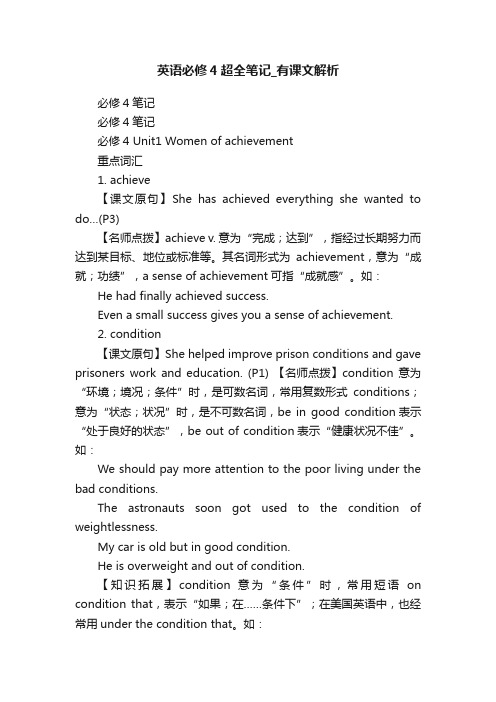
英语必修4超全笔记_有课文解析必修4笔记必修4笔记必修4 Unit1 Women of achievement重点词汇1. achieve【课文原句】She has achieved everything she wanted to do…(P3)【名师点拨】achieve v. 意为“完成;达到”,指经过长期努力而达到某目标、地位或标准等。
其名词形式为achievement,意为“成就;功绩”,a sense of achievement可指“成就感”。
如:He had finally achieved success.Even a small success gives you a sense of achievement.2. condition【课文原句】She helped improve prison conditions and gave prisoners work and education. (P1) 【名师点拨】condition 意为“环境;境况;条件”时,是可数名词,常用复数形式conditions;意为“状态;状况”时,是不可数名词,be in good condition表示“处于良好的状态”,be out of condition表示“健康状况不佳”。
如:We should pay more attention to the poor living under the bad conditions.The astronauts soon got used to the condition of weightlessness.My car is old but in good condition.He is overweight and out of condition.【知识拓展】condition意为“条件”时,常用短语on condition that,表示“如果;在……条件下”;在美国英语中,也经常用under the condition that。
人教版高中英语必修四Unit1 单元教学笔记
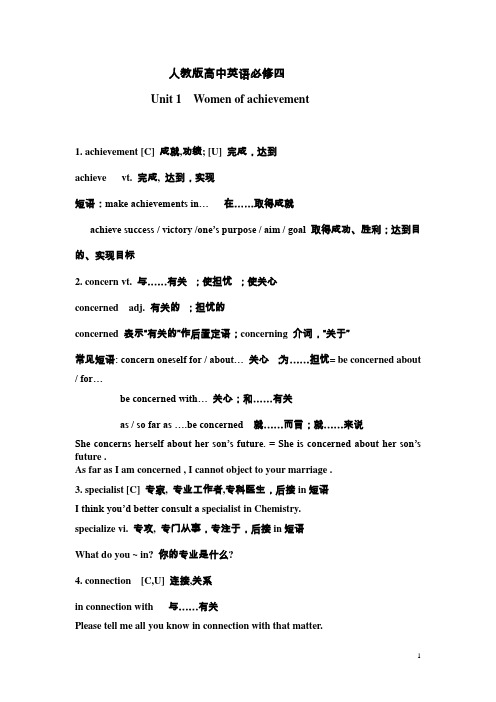
人教版高中英语必修四Unit 1 Women of achievement1. achievement [C] 成就,功绩; [U] 完成,达到achieve vt. 完成, 达到,实现短语:make achievements in… 在……取得成就achieve success / victory /one’s purpose / aim / goal 取得成功、胜利;达到目的、实现目标2. concern vt. 与……有关;使担忧;使关心concerned adj. 有关的;担忧的concerned 表示“有关的”作后置定语;concerning 介词,“关于”常见短语: concern oneself for / about… 关心;为……担忧= be concerned about / for…be concerned with… 关心;和……有关as / so far as ….be concerned 就……而言;就……来说She concerns herself about her son’s future. = She is concerned about her son’s future .As far as I am concerned , I cannot object to your marriage .3. specialist [C] 专家, 专业工作者,专科医生,后接in短语I think you’d better consult a specialist in Chemistry.specialize vi. 专攻, 专门从事,专注于,后接in短语What do you ~ in? 你的专业是什么?4. connection [C,U] 连接,关系in connection with 与……有关Please tell me all you know in connection with that matter.请把你知道的关于那件事的所有的情况告诉我。
必修四unit1必备知识点
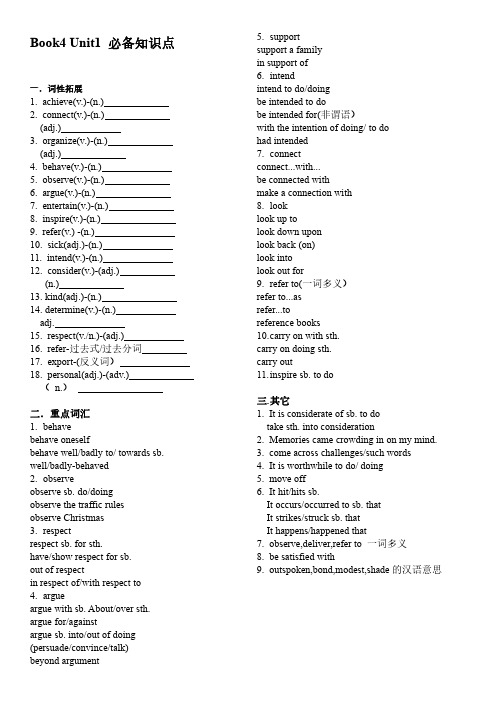
Book4Unit1必备知识点一.词性拓展1.achieve(v.)-(n.)2.connect(v.)-(n.)(adj.)anize(v.)-(n.)(adj.)4.behave(v.)-(n.)5.observe(v.)-(n.)6.argue(v.)-(n.)7.entertain(v.)-(n.)8.inspire(v.)-(n.)9.refer(v.)-(n.)10.sick(adj.)-(n.)11.intend(v.)-(n.)12.consider(v.)-(adj.)(n.)13.kind(adj.)-(n.)14.determine(v.)-(n.)adj.15.respect(v./n.)-(adj.)16.refer-过去式/过去分词17.export-(反义词)18.personal(adj.)-(adv.)(n.)二.重点词汇1.behavebehave oneselfbehave well/badly to/towards sb. well/badly-behaved2.observeobserve sb.do/doingobserve the traffic rules observe Christmas3.respectrespect sb.for sth.have/show respect for sb.out of respectin respect of/with respect to4.argueargue with sb.About/over sth. argue for/againstargue sb.into/out of doing (persuade/convince/talk) beyond argument 5.supportsupport a familyin support of6.intendintend to do/doingbe intended to dobe intended for(非谓语)with the intention of doing/to dohad intended7.connectconnect...with...be connected withmake a connection with8.looklook up tolook down uponlook back(on)look intolook out for9.refer to(一词多义)refer to...asrefer...toreference books10.carry on with sth.carry on doing sth.carry out11.inspire sb.to do三.其它1.It is considerate of sb.to dotake sth.into consideration2.Memories came crowding in on my mind.e across challenges/such words4.It is worthwhile to do/doing5.move off6.It hit/hits sb.It occurs/occurred to sb.thatIt strikes/struck sb.thatIt happens/happened that7.observe,deliver,refer to一词多义8.be satisfied with9.outspoken,bond,modest,shade的汉语意思。
必修四unit1单元知识点
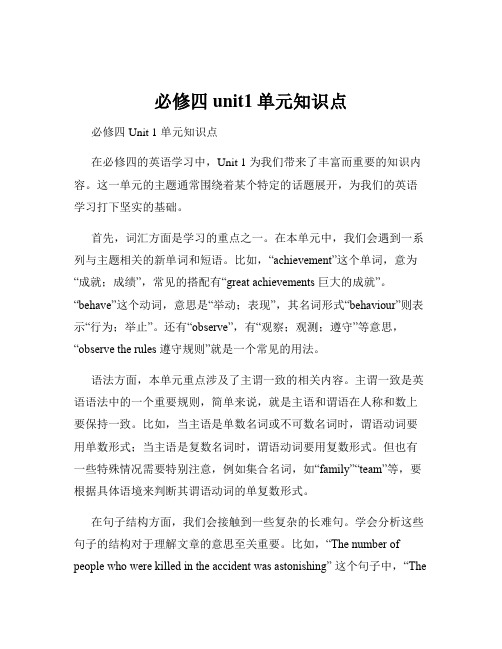
必修四unit1单元知识点必修四 Unit 1 单元知识点在必修四的英语学习中,Unit 1 为我们带来了丰富而重要的知识内容。
这一单元的主题通常围绕着某个特定的话题展开,为我们的英语学习打下坚实的基础。
首先,词汇方面是学习的重点之一。
在本单元中,我们会遇到一系列与主题相关的新单词和短语。
比如,“achievement”这个单词,意为“成就;成绩”,常见的搭配有“great achievements 巨大的成就”。
“behave”这个动词,意思是“举动;表现”,其名词形式“behaviour”则表示“行为;举止”。
还有“observe”,有“观察;观测;遵守”等意思,“observe the rules 遵守规则”就是一个常见的用法。
语法方面,本单元重点涉及了主谓一致的相关内容。
主谓一致是英语语法中的一个重要规则,简单来说,就是主语和谓语在人称和数上要保持一致。
比如,当主语是单数名词或不可数名词时,谓语动词要用单数形式;当主语是复数名词时,谓语动词要用复数形式。
但也有一些特殊情况需要特别注意,例如集合名词,如“family”“team”等,要根据具体语境来判断其谓语动词的单复数形式。
在句子结构方面,我们会接触到一些复杂的长难句。
学会分析这些句子的结构对于理解文章的意思至关重要。
比如,“The number of people who were killed in the accident was astonishing” 这个句子中,“Thenumber of”表示“的数量”,其后的谓语动词要用单数形式,“who were killed in the accident”是一个定语从句,用来修饰先行词“people”。
阅读部分,本单元的文章通常具有一定的深度和难度。
通过阅读这些文章,我们不仅能够提高阅读理解能力,还能学习到一些新的表达方式和写作技巧。
比如,文章中可能会运用到各种修辞手法,如比喻、拟人、排比等,以增强文章的表现力和感染力。
必修四unit1单元知识点

必修四unit1单元知识点必修四 Unit1 单元知识点在高中英语的学习中,必修四 Unit1 包含了众多重要的知识点,下面我们来一起梳理一下。
首先是词汇部分。
这一单元中出现了许多与女性、成就相关的词汇,比如“achievement”(成就;功绩),“welfare”(福利;福利事业),“project”(项目;工程;规划)等。
对于这些词汇,不仅要掌握它们的基本含义,还要了解其常见的搭配和用法。
例如,“make an achievement”表示“取得成就”,“welfare system”表示“福利制度”,“carry out a project”表示“实施一个项目”。
语法方面,重点是主谓一致。
主谓一致是指主语和谓语在人称和数上保持一致。
在这个单元中,我们需要特别注意以下几种情况:1、当主语是“and”连接的两个或多个名词时,如果指的是两个不同的人或事物,谓语动词用复数;如果指的是同一人或事物,谓语动词用单数。
例如,“The writer and poet is coming”(这位作家兼诗人要来了。
)这里指的是同一个人,所以用单数;“The writer and the poet are coming”(这位作家和这位诗人要来了。
)这里指的是两个人,所以用复数。
2、当主语后面跟有“with/along with/together with/except/but/as wellas/like/rather than/including 等+名词”时,谓语动词的数要与主语保持一致。
例如,“The teacher along with his students is visiting the museum”(老师和他的学生们正在参观博物馆。
)主语是“the teacher”,所以谓语动词用单数。
3、不定代词“each/every/no/many a +名词”作主语时,谓语动词用单数。
例如,“Each student has a book”(每个学生都有一本书。
高中英语必修四第一单元重点、难点

高中英语必修四第一单元重点、难点Unit One Women of achievement1、Then we follow as they wander into the forest. 然后当它们向森林走去时,我们就跟随着。
wander(1) 游荡;漫游They wandered in Europe for three months. 他们在欧洲漫游了三个月。
His eyes wandered round the full house. 他用眼睛把整个房子扫视了一遍。
(2) 迷路乱走Don’t wander off the road into the forest. 别离开大路进入森林。
The dog wandered off and got lost. 狗迷路走失了。
(3) 蜿蜒曲折The river wanders through some very beautiful country.小河蜿蜒曲折穿越漂亮的乡村。
The little stream wanders through the woods. 小溪从林中穿过。
(4) 胡想;说胡话Don’t let your thought wander in class. 上课时思想别跑毛。
His mind wandered back to his college days. 他的思想又回到了大学时代。
2、In pairs discuss what they have in common and what makes them great.同桌互相讨论他们有什么共同点,什么使得他们很伟大。
common adj. & n.(1)共同的,常见的You ’ve made a common mistake again. 你又犯了个常见错误。
(2)共同的;公用的Parks are common property to the city’s people. 城市的公园是这个城市的人的公共财产。
必修四unit1课文知识点
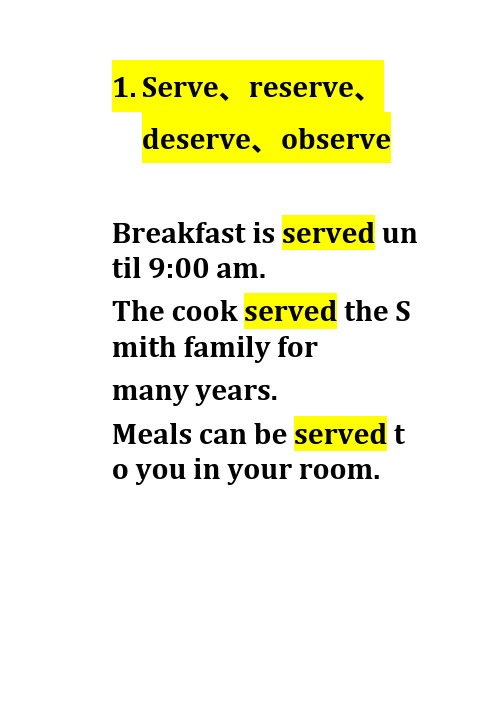
1.Serve、reserve、deserve、observeBreakfast is served un til 9:00 am.The cook served the S mith family for many years.Meals can be served t o you in your room.I'll reserve a table for fiveA double room with a balcony overlooking the sea hadbeen reserved for him.You have a gift for creating,you deserve a better j ob.The man deserves punishing /to be punished.He deserved sending /to be sent to prison. We often observe the behavior of birds.I observed him closely as I worked together with him. The old man was sent there as an observer. During our observatio n of the rats, wemade severalnew discoveries.Anyone who comes he re must observethe rules.We should observe th e local custom.Do you observe Christ mas Day in your country?I observed her walk a way with a smile. She was observed to walk away with a smile.2.Only倒装1). Youcan solve this problem only in this way. 2).He realized he had made a big mistake only after hehadspoken out the word 3).Only socialism can save China.4). You will make your English improved only by doing so.3.respect1). We respect her for her hardwork.We deeply respect his courage.2). He often help the homeless, he should gain everyone’s respect.gain/win/earnone’s respect 3). We show great respect for our math teacher.4).The students gave a respectful bow to the respectable professor when he passed by.4.argue“争辩,争论,主张”1). Don’t argue about this matter any more.2).The boy argued with his teacher about hishomework.3). The boy had an argument withhis teacher about hishomework.4).He argued that his son should be a lawyer in thefuture.5.entertainment 娱乐,消遣,款待Watching TV is a form of entertainment.A cinema is a place of ent ertainment.We gave an entertainment to our new friends.我们款待了我们的新朋友。
高中英语必修四Unit1知识归纳
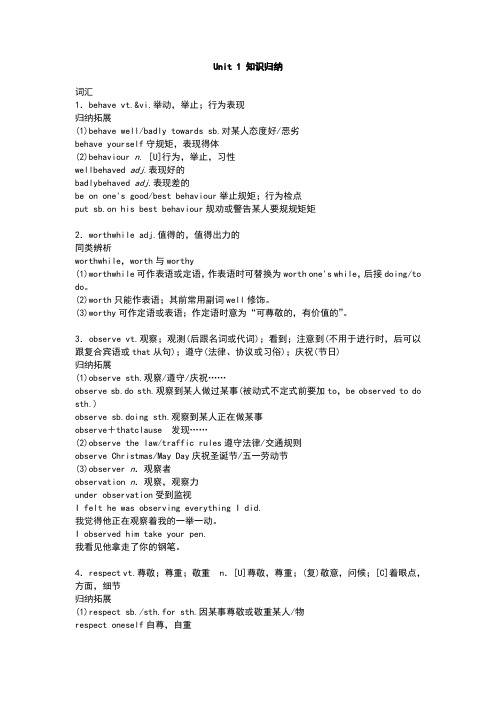
Unit 1 知识归纳词汇1.behave vt.&vi.举动,举止;行为表现归纳拓展(1)behave well/badly towards sb.对某人态度好/恶劣behave yourself守规矩,表现得体(2)behaviour n. [U]行为,举止,习性wellbehaved adj.表现好的badlybehaved adj.表现差的be on one's good/best behaviour举止规矩;行为检点put sb.on his best behaviour规劝或警告某人要规规矩矩2.worthwhile adj.值得的,值得出力的同类辨析worthwhile,worth与worthy(1)worthwhile可作表语或定语,作表语时可替换为worth one's while,后接doing/to do。
(2)worth只能作表语;其前常用副词well修饰。
(3)worthy可作定语或表语;作定语时意为“可尊敬的,有价值的”。
3.observe vt.观察;观测(后跟名词或代词);看到;注意到(不用于进行时,后可以跟复合宾语或that从句);遵守(法律、协议或习俗);庆祝(节日)归纳拓展(1)observe sth.观察/遵守/庆祝……observe sb.do sth.观察到某人做过某事(被动式不定式前要加to,be observed to do sth.)observe sb.doing sth.观察到某人正在做某事observe+thatclause 发现……(2)observe the law/traffic rules遵守法律/交通规则observe Christmas/May Day庆祝圣诞节/五一劳动节(3)observer n.观察者observation n.观察,观察力under observation受到监视I felt he was observing everything I did.我觉得他正在观察着我的一举一动。
高一必修四英语unit1 知识点

高一必修四英语unit1 知识点Unit 1: Culture ShockCulture Shock is a common phenomenon that individuals experience when they move to a different country or encounter a culture different from their own. It refers to the feeling of disorientation and confusion that arises due to unfamiliar customs, traditions, language, and social norms. In this article, we will explore the key knowledge points related to Culture Shock in the context of the English curriculum for the first year of high school.1. Definition of Culture ShockCulture Shock is the feeling of discomfort or disorientation that a person experiences when they move to a new cultural environment. It can manifest in various ways, such as anxiety, frustration, homesickness, or even physical symptoms like headaches and insomnia. Culture Shock occurs when individuals are unable to make sense of the new culture they are exposed to, leading to feelings of isolation and confusion.2. Stages of Culture ShockCulture Shock is typically characterized by four stages: the Honeymoon Stage, the Negotiation Stage, the Adjustment Stage, and the Mastery Stage.a) Honeymoon Stage: During this stage, individuals are fascinated by the new culture and everything seems exciting and enjoyable. They are infatuated with the differences and may overlook any negative aspects.b) Negotiation Stage: In this stage, reality sets in, and individuals start to encounter difficulties and challenges. Differences in language, social norms, and daily routines may become overwhelming and cause frustration and homesickness.c) Adjustment Stage: As individuals slowly adapt to the new culture, they begin to feel more comfortable and confident. They develop coping mechanisms and start to understand and accept the cultural differences.d) Mastery Stage: In the final stage of Culture Shock, individuals become fully integrated into the new culture. They are able to navigate the society with ease and feel a sense of belonging.3. Coping Strategies for Culture ShockTo effectively cope with Culture Shock, individuals can employ various strategies:a) Developing Cultural Awareness: Learning about the new culture, its customs, traditions, and values can help individuals understand and appreciate the differences. This can be done through reading, attending cultural events, and interacting with locals.b) Building a Support Network: Connecting with other expatriates or individuals who have experienced Culture Shock can provide a sense of community and support. Sharing experiences and seeking advice from others can greatly help in dealing with the challenges.c) Developing Language Skills: Language often plays a crucial role in adapting to a new culture. Learning the local language or improving language proficiency can enhance communication and ease integration into the society.d) Maintaining a Positive Attitude: Approaching the new culture with an open and positive mindset can make a significant difference inadaptation. Embracing new experiences and being flexible can help individuals navigate the challenges more effectively.4. Cultural Sensitivity and EmpathyCulture Shock is a reminder of the importance of cultural sensitivity and empathy. It is crucial to approach a new culture with an open mind, respect the differences, and avoid making assumptions or judgments. Developing empathy towards the challenges faced by individuals experiencing Culture Shock can foster inclusivity and understanding in multicultural environments.In conclusion, Culture Shock is a natural response to encountering a new culture. It is important to recognize the stages of Culture Shock and employ coping strategies to effectively adapt and integrate into the new cultural environment. By fostering cultural awareness, building a support network, developing language skills, and maintaining a positive attitude, individuals can embrace the experience of living in a different culture and grow both personally and interculturally.。
必修四unit1单元知识点

必修四unit1单元知识点必修四 Unit 1 单元知识点一、重点单词1、 achievement əˈtʃiːvmənt n 成就;功绩例句:The invention of the computer is a great achievement (计算机的发明是一项伟大的成就。
)常见搭配:make an achievement 取得成就2、welfare ˈwelfeə(r) n 福利;福利事业例句:The government should pay more attention to the welfare of the poor (政府应该更加关注穷人的福利。
)相关短语:welfare system 福利制度3、project ˈprɒdʒekt n 项目;工程;规划例句:They are working on a new project (他们正在进行一个新的项目。
)常见搭配:carry out a project 实施一个项目4、institute ˈɪnstɪtjuːt n 学会;学院;协会例句:The Institute of Technology offers various courses (这所技术学院提供各种课程。
)5、specialist ˈspeʃəlɪst n 专家;专业工作者例句:He is a specialist in heart diseases (他是心脏病方面的专家。
)6、 connection kəˈnekʃn n 连接;关系例句:There is a close connection between smoking and lung cancer (吸烟和肺癌之间有密切的联系。
)相关短语:in connection with 与有关7、campaign kæmˈpeɪn n 运动;战役 vi 作战;参加运动例句:They launched a campaign to raise money for charity (他们发起了一场为慈善筹款的运动。
高一英语必修四unit1知识点总结

高一英语必修四unit1知识点总结高一英语必修四 Unit 1 知识点总结Unit 1: Great Scientists本单元主要讲述了一些伟大的科学家及其重要的发现和贡献。
以下是我对本单元的知识点做的总结:一、重点词汇及短语:1. experiment n. 实验2. prove v. 证明3. conduct v. 执行4. method n. 方法5. observe v. 观察6. predict v. 预测7. publish v. 出版8. individual n. 个人9. independent adj. 独立的10. theory n. 理论11. invent v. 发明12. occasion n. 场合13. process n. 过程14. molecule n. 分子15. analysis n. 分析16. infection n. 感染二、重要句型及语法:1. It is said/believed that... 据说/相信...例句:It is said that Thomas Edison conducted thousands of experiments before inventing the electric light bulb.2. In addition to... 除了...之外例句:In addition to his theories on gravity, Isaac Newton also made significant contributions to the field of mathematics.3. Not only...but also... 不仅...而且...例句:Marie Curie was not only the first woman to win a Nobel Prize but also the only person to win a Nobel Prize in two different scientific fields.4. as well as 和...一样,除了...还...例句:Albert Einstein is famous for his theory of relativity as well as his equation E=mc².5. whether...or... 是否...还是...例句:Scientists are still debating whether the universe will continue to expand or eventually contract.三、重要知识点:1. The Scientific Method 科学方法科学方法包括观察、提出假设、进行实验、分析数据、得出结论等步骤。
必修四unit1知识点

1、 This means going back to a place where we left the chimp family sleeping in a tree the night before.这意味着我们要返回前一天夜晚我们走开黑猩猩睡觉的大树旁。
mean to do=plan to do计划或打算干某事;mean doing 意味着,意思是①I meant to go running this morning, but I overslept.我今日清晨本打算去跑步,可是我睡过头了。
②I didn ’t mean to hurt you; I meant studying hard is important to everyone.我不是存心刺伤你,我的意思是努力学习对每一个人来说都重要。
有关链接:try to do全力去做try doing试着做stop to do停止去干其他事stop doing停止正干的事go on to do 持续干此外一件事go on doing持续干同一件事remember to do记得要干某事remember doing记得干过某事forget to do忘掉了要干某事forget doing忘掉了干过某事regret to tell sb遗憾地对某人说regret doing sth懊悔干了某事want to do想要干某事want doing需要need to do有必需干need doing需要consider to do以为consider doing考虑去做2、 But the evening makes it all worthwhile.可是到夜晚时分我们感觉这全部都是值得的。
worthwhile值得的(做表语或定语)worth some money值多少钱(worth不置于名词以前)worth doing值得做①It is a worthwhile job and it is worth doing right now.这是一项有价值的工作,值得立刻做。
- 1、下载文档前请自行甄别文档内容的完整性,平台不提供额外的编辑、内容补充、找答案等附加服务。
- 2、"仅部分预览"的文档,不可在线预览部分如存在完整性等问题,可反馈申请退款(可完整预览的文档不适用该条件!)。
- 3、如文档侵犯您的权益,请联系客服反馈,我们会尽快为您处理(人工客服工作时间:9:00-18:30)。
Unit 1 Discovering useful structures
---Modal Verbs(I)
(3)用于发生了某种于说话人的愿望相反、不受欢迎的事时,意思是“偏偏”、“偏要”。
Why must he do it that way?Why must it rain on Sunday?
(4)表示推测,只能用于肯定句。
He must be reading novels now.The road is we t.It must have rained last night.
1. 情态动词的语法特征情态动词有一定的意义,表示或暗示某种情绪或态度,表示可能、建议、愿望、必要、允许、能力等。
2.情态动词没有人称和数的变化,即不随主语的不同而变化。
3.情态动词不能独立使用,必须和实义动词一起构成谓语。
4.情态动词除ought和have外,后面只能接不带to的不定式。
5.情态动词没有非谓语形式,即没有不定式、
分词等形式。
must表示必须,多处于义务、责任或强制命令(must提问,否定回答用needn’t或don’t have to).You must hand in your homework today.
(2)mustn’t表示禁止。
意思是“不许”、“不准”、“不可以”。
You mustn’t smoke here.can/could
(1)表示能力Can you speak Japanese?
(2)表示推测时,只用在否定句或疑问句中。
He can’t be at home now.
(3)表示允许(许可或请求许可)You can go now,but he can’t.
(4)表惊异、怀疑等
How can you be so rude?
could可表示能力或可能性,多用于过去,也可指现在,通常表示虚拟或作为can的委婉形式。
can?/could?+?have?done
(1)在肯定句中表示“本来可以做而实际上没做某事”;
(2)在疑问句或否定句中表示对过去行为的怀疑或不肯定,?表示推测。
You could have done better,but you didn’t try your best.你本来可以做得更好,但你没努力。
? He can’t have been to that town.他不可能去过那个城。
may/might
(1)表示可能性,might比may可能性更
小。
It may be true.He might not come to
day.
(2)表示请求、许可,多用于肯定和疑问句中May I ask you a question?
(2)表示愿
望May you be happy all your life.might
比may语气更委婉may/might表示推测
时,表示对现在或将来要发生的事情把握不
大。
might/may have done表示对过去发生的动作进行的可能性推测。
(1) He may have gone to the clinic.他可能去医务室了。
(2)He might have read about the news in the newsp aper.他可能已经从报纸上知道这个消息了。
will/would表示意愿,will表示现在的意
愿,would表示过去的意愿。
1.Go where you will.She asked if I would go w
ith them.
2.表示征求意见或提出请求,主要用于第二人称的疑问句中,will和would均可用,would此时并不表过去,而表示委婉语气。
Would Sunday night suit you?Will/Wo uld you please post the letter for me?
3.表示习惯和倾向性will表示现在的习惯,would表示过去的习惯(=used to do)。
Oil will float on water. When he was a child,he would often go skiing.
4.表示推测 will用于谈论现在,would可用于谈论过去,也可用于谈论现在(语气较委婉)。
①Ask him.He will know.②Every family would have some sort of trouble.③I thought you would have finished it by now.
shall/should1.在陈述句中,shall用于二、三人称表示允诺、警告、命令、决心等。
You shall do as I say.(命令)
Nothing shall stop me doing it.(决心)
Tell him that he shall have the book tomorrow. (允诺)
2.shall在疑问句中,用于一、三人称,用来表示请求或征求意见。
Shall I open the window for you?(征求意见)Shall he fetch some water for you?(请求)
3.should常表示应当,意思和ought to相近,但语气较弱。
Young people should learn how to use compu ters.
4.should用于可能性推测时,表“应该,很可能”They left at5:30.They should get there now.1.Jack described his father,who____a br ave boy many years ago,as a strong–willed man.(2010安徽卷) A.would be B.would have been
C.must be
D.must have been答案:D解析:句意为“杰克把他的父亲描述为一个意志坚强的人,他的父亲多年前肯定很勇敢”用must have been表示对过去事情的肯定推测。
5.should have done表示责备或批评,意为“本应该…但”You should have told her the truth earli er.She shouldn’t have left without saying a word.。
